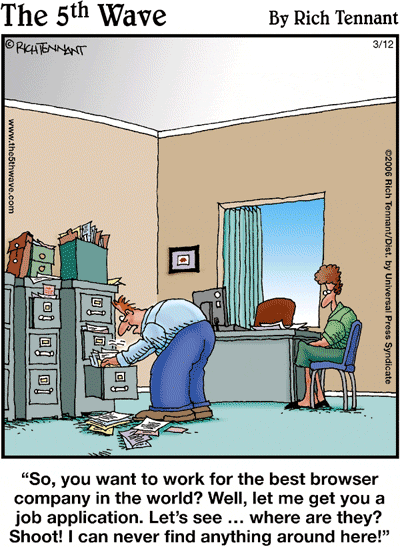 I have some searches going for Opera, and am updated regulary by web feeds (RSS/Atom) and by mail, from search engines and blog searches. The results are very mixed, and quite a bit of it is without interest.However, there are a few things that appear from time to time – one of those things are about paying for Opera.
I have some searches going for Opera, and am updated regulary by web feeds (RSS/Atom) and by mail, from search engines and blog searches. The results are very mixed, and quite a bit of it is without interest.However, there are a few things that appear from time to time – one of those things are about paying for Opera.
True, you used to have to pay for a registered version of Opera to remove the ads, or to continue using it after the trial period before that. Obviously, there will be many search results that show this, but I’m not talking about that. What I have in mind, are new articles and reviews, that are written well after the browser went free.
In many such articles, reviews and browser comparisions, you read about how you have to pay for the registered version, how some features (kiosk mode) is available only in the registered version, how you have to put up with ads or get the registered version… How come people are still stuck in the past?
I can – in part – understand those who write general articles, as they may just rely on their memory of a browser they tried several months ago – a browser that did have ads, or needed to be registered for a fee. Understand – but still think it’s bad workmanship, not to check the current situation. After all, browser development happens fast.
Then there are those who have checked a bit. They do get the current browser version correct, but still manage to miss one important fact: That Opera is free. Gratis. I’ve even seen reviews of the browser, including the technical preview of Opera 9, where the reviewer manage to mention the ads, or the “registered version”. Hello? How did you do the review? I mean, just installing and trying the browser should tell you that there are no ads there. They’re gone. There are no registered and ad supported versions – there’s just one, free version.
I’ve tried to correct a few of these, but there are a couple of thoughts swirling around in my mind: Why doesn’t people check things more, to be sure they are correct? Especially reviewers. What are their motives? And if they can’t get such basic facts right – how can I trust their article? Are they negligent only when it comes to Opera, or is this how they treat all they write about?
It should be so easy to do things right in the first place – instead, I’m left with a bit distrust due to sloppy work.

 I have some searches going for Opera, and am updated regulary by web feeds (RSS/Atom) and by mail, from search engines and blog searches. The results are very mixed, and quite a bit of it is without interest.However, there are a few things that appear from time to time – one of those things are about paying for Opera.
I have some searches going for Opera, and am updated regulary by web feeds (RSS/Atom) and by mail, from search engines and blog searches. The results are very mixed, and quite a bit of it is without interest.However, there are a few things that appear from time to time – one of those things are about paying for Opera. DRM is needed. DRM is the only way to prevent everyone from making pirate copies of software. DRM is the only way to keep companies profitable. Not using DRM must be punished. Right?
DRM is needed. DRM is the only way to prevent everyone from making pirate copies of software. DRM is the only way to keep companies profitable. Not using DRM must be punished. Right?